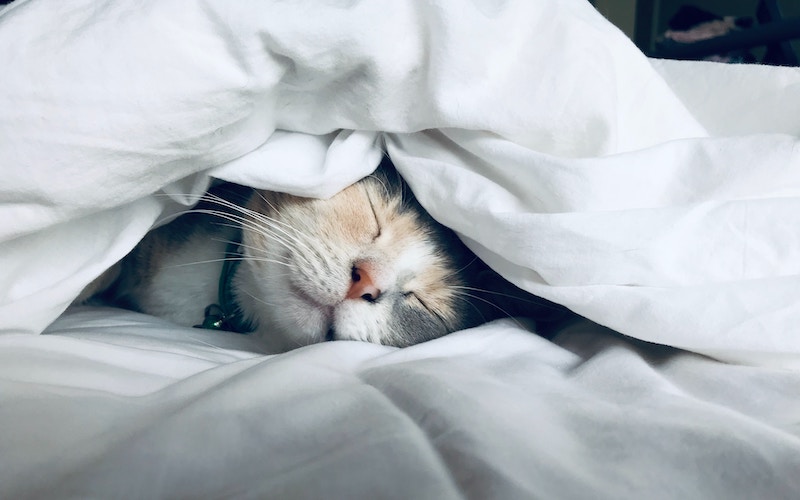How Many Hours Do You Need in Bed, and Why?
Episode #1 of the course Sleep hacks: Using science to improve your sleep by John Robin
Welcome to your first sleep hack, the beginning of our course on sleep science.
My name is John Robin. I’m an author and entrepreneur. I enjoy writing educational nonfiction. I’ve now written ten Highbrow courses about writing, math, science, and productivity, including my most recent, “Master Your Time: The Secret to Being Insanely Productive.”
One thing I enjoy about writing these courses is when students reach out to ask questions. One such question led to this very course: “How much sleep do you actually need to be productive?”
I highly recommend that when you are finished with this course, you check out “How to Manufacture the Greatest Sleep of Your Life.” I’ve written this course both for those who haven’t taken it yet and for those who have but want to know more about the science behind why we sleep and how to use that to continually innovate sleep.
Your goal is likely the same as mine, which is to find the balance between:
• spending as little time in bed as necessary
• being maximally effective (and healthy) every day
Let’s kick this course off by returning to that question: How much sleep do you actually need?
Five Hours in Bed Is Not Enough
I once heard an impressive claim: You don’t need eight hours of sleep! You can get by just fine on five. In fact, Jeffrey Katzenberg, a former chairman for Walt Disney Studios and arguably a very successful man worth an estimated $800,000,000, who also leads a well-balanced life with family and charity work, claimed in an interview that he only sleeps five hours a night.
That’s a whole extra day each week, compared to those who sleep eight!
But as you’ll see in this interview with Hollywood Reporter, under this facade of claims, there are numerous problems. Aside from Steven Spielberg writing The Goonies after being up most of the night due to a nightmare, the article reveals one important thing: the law of excluded exceptions.
This is a type of bias and it drives our anti-sleep culture.
Imagine a 2×2 grid, like this:
| High success story, high sleep | High success story, low sleep |
| Low success story, high sleep | Low success story, low sleep |
Which of the four options appeals the most to us? High success stories always catch our attention, especially when they match our expectations. We want to emulate legendary Thomas Edison, Elon Musk, or Jeffrey Katzenberg, all of whom are famous for sleeping little in order to get more done.
But what about Arianna Huffington, founder of Huffington Post (also a multimillionaire), who sleeps a lot? What about the fact that many people aren’t famous or millionaires and some sleep a lot and some sleep a little, and neither group have great success simply because success is not as simple as spending more hours working? What about those who burn out because they work too hard and don’t sleep enough?
We usually don’t pay attention to that because our biases make us only focus on what we’re interested in: high success, low sleep (the exhausted worker toughs it out) or low success, high sleep (the lazy person gets nowhere). We exclude the exceptions we’re not interested in.
And because of this, we miss the whole point: the actual science behind sleep!
It’s worth noting that absolutely NO sleep research has supported the claim that we can get by just fine on five to six hours a night. In fact, according to 320 studies, if you’re an adult aged 18-64, you should be getting seven to nine hours a night.
One specific study actually showed that people who operate on four to six hours a night are as impaired as people who operate on less than four, and have coordination impairment comparable to those who are mildly intoxicated. People in this study who slept six to eight hours performed on a significantly higher level in cognitive tasks.
Another analysis of eleven sleep studies covering 1,000,000 adults found that those who slept eight hours were 11% more likely to die from heart disease or stroke, while those who slept six hours were 33% more likely.
Science tells us that while certain highly successful people might claim to sleep fewer than six hours and get more done, in fact, these individuals are either abnormal and not to be emulated as standards of health, or they are normal and the long-term effects of sleep deprivation just haven’t told us their complete story yet.
So, there’s today’s hack: Sleep loss is not the standard to strive toward!
To be clear, this is on average. Well-rested, we can get by on less sleep here or there. But we’ll talk more about that in the days to come!
Stay tuned for tomorrow, when we’ll explore, on the most fundamental level, just what sleep is, to accept why we need those eight-plus hours.
Recommended book
Why We Sleep: Unlocking the Power of Sleep and Dreams by Matthew Walker, PhD
Share with friends

